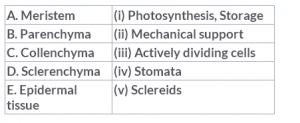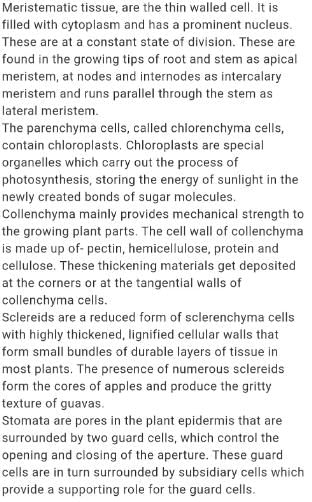NEET Exam > NEET Tests > Test: Meristematic Tissues & Permanent Tissues (Old NCERT) - NEET MCQ
Test: Meristematic Tissues & Permanent Tissues (Old NCERT) - NEET MCQ
Test Description
10 Questions MCQ Test - Test: Meristematic Tissues & Permanent Tissues (Old NCERT)
Test: Meristematic Tissues & Permanent Tissues (Old NCERT) for NEET 2024 is part of NEET preparation. The Test: Meristematic Tissues & Permanent Tissues (Old NCERT) questions and answers have been prepared
according to the NEET exam syllabus.The Test: Meristematic Tissues & Permanent Tissues (Old NCERT) MCQs are made for NEET 2024 Exam.
Find important definitions, questions, notes, meanings, examples, exercises, MCQs and online tests for Test: Meristematic Tissues & Permanent Tissues (Old NCERT) below.
Solutions of Test: Meristematic Tissues & Permanent Tissues (Old NCERT) questions in English are available as part of our course for NEET & Test: Meristematic Tissues & Permanent Tissues (Old NCERT) solutions in
Hindi for NEET course.
Download more important topics, notes, lectures and mock test series for NEET Exam by signing up for free. Attempt Test: Meristematic Tissues & Permanent Tissues (Old NCERT) | 10 questions in 10 minutes | Mock test for NEET preparation | Free important questions MCQ to study for NEET Exam | Download free PDF with solutions
Test: Meristematic Tissues & Permanent Tissues (Old NCERT) - Question 1
Jute fibres are obtained from the
Detailed Solution for Test: Meristematic Tissues & Permanent Tissues (Old NCERT) - Question 1
Test: Meristematic Tissues & Permanent Tissues (Old NCERT) - Question 2
The type of support tissues that consists of uneven thickened primary walls with elongated cells is called
Detailed Solution for Test: Meristematic Tissues & Permanent Tissues (Old NCERT) - Question 2
| 1 Crore+ students have signed up on EduRev. Have you? Download the App |
Test: Meristematic Tissues & Permanent Tissues (Old NCERT) - Question 3
Intercalary meristem leads in
Detailed Solution for Test: Meristematic Tissues & Permanent Tissues (Old NCERT) - Question 3
Test: Meristematic Tissues & Permanent Tissues (Old NCERT) - Question 4
Fascicular, interfascicular and extrastellar cambium together constitute
Detailed Solution for Test: Meristematic Tissues & Permanent Tissues (Old NCERT) - Question 4
Test: Meristematic Tissues & Permanent Tissues (Old NCERT) - Question 5
The long plants are capable of standing erect due to the presence of
Detailed Solution for Test: Meristematic Tissues & Permanent Tissues (Old NCERT) - Question 5
Test: Meristematic Tissues & Permanent Tissues (Old NCERT) - Question 6
Cells of this tissue are living and show angular wall thickening. They also provide mechanical support. The tissue is
Detailed Solution for Test: Meristematic Tissues & Permanent Tissues (Old NCERT) - Question 6
Test: Meristematic Tissues & Permanent Tissues (Old NCERT) - Question 7
Which of the following is nucleated?
Detailed Solution for Test: Meristematic Tissues & Permanent Tissues (Old NCERT) - Question 7
Test: Meristematic Tissues & Permanent Tissues (Old NCERT) - Question 8
Which among the following is incorrect about tissues in a plant?
Detailed Solution for Test: Meristematic Tissues & Permanent Tissues (Old NCERT) - Question 8
Test: Meristematic Tissues & Permanent Tissues (Old NCERT) - Question 9
Match the following and choose the correct option from below:

Detailed Solution for Test: Meristematic Tissues & Permanent Tissues (Old NCERT) - Question 9
Test: Meristematic Tissues & Permanent Tissues (Old NCERT) - Question 10
At maturity, which of the following is non-nucleated?
Detailed Solution for Test: Meristematic Tissues & Permanent Tissues (Old NCERT) - Question 10
Information about Test: Meristematic Tissues & Permanent Tissues (Old NCERT) Page
In this test you can find the Exam questions for Test: Meristematic Tissues & Permanent Tissues (Old NCERT) solved & explained in the simplest way possible.
Besides giving Questions and answers for Test: Meristematic Tissues & Permanent Tissues (Old NCERT), EduRev gives you an ample number of Online tests for practice
Download as PDF


















